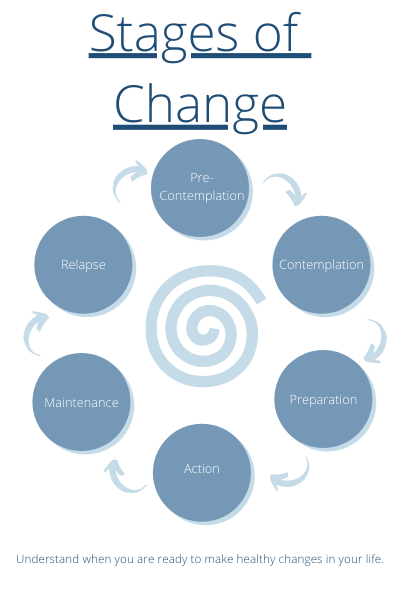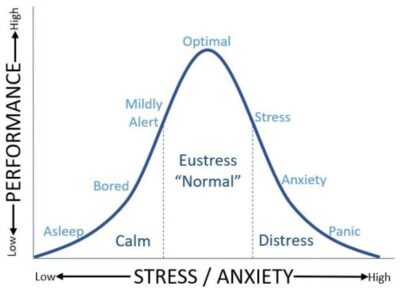How Stress Impacts Your Body

Stress is not just an emotion. It can impact your physiological system (aka internal system), physical body, behaviors, and emotions.
Have you ever…
- Snapped at your significant other after a long, stressful day at work?
- Sweated during a presentation despite the room being cold?
- Found yourself in the bathroom a lot more frequently on the day of an important meeting or test?
- Struggled to focus when you had an overload of tasks going on?
- Couldn’t seem to breathe well after being startled?
We are breaking down some of the symptoms you may experience when stressed or anxious. As you read through the list, I encourage you to take note of the symptoms you experience when stressed. But first, let’s talk about how the stress process occurs.
The Effects of Stress on Your Physiological System
When your brain senses some type of stressor, a chemical signal travels through your body as an alert signal, telling your body to be ‘on edge’ to respond to the stressor. The primary chemicals involved are adrenaline and cortisol. As those chemicals flood your body, certain physiological (i.e., internal) symptoms start occurring.
Your heart rate increases, causing you to feel chest pain or tightness. Blood starts pumping harder and faster throughout your body, causing you to be sweaty or feel hot and experience shallow or difficulty breathing. Your breathing and blood flow changes may cause you to experience lightheadedness or dizziness. Your body wants to put energy towards the stressor, so your digestive system shuts down causing you to experience nausea, diarrhea, constipation, and/or appetite changes. The blood moves into your hands and feet to respond to the stressor. This may cause your hands and feel to feel shaky, cold, clammy, numb, tingly, or enlarged.
These symptoms can make you feel uncomfortable, but it is a protective measure your body implements to combat a stressor. This response is oftentimes called the fight or flight response.
Fight or Flight Response
Let’s break down this response a little more to understand how it can be helpful. If I am hiking in the woods and a bear starts running at me, I want my body to respond! I want my internal system to ramp to respond to the threat of the bear. In that situation, our body has two primary ways of reacting to the bear – fight or flight.
Fighting can be physically fighting, but it can also manifest in other ways. If you are in a fight with your significant other, hopefully it doesn’t result in physical fighting. But instead, that fight response can be snapping or yelling. The other primary response is flight, or physically running away. It can also be avoidance of situations or people that you experience stress around.
Emotional and Behavioral Responses to Stress
When your internal system ramps up, it can then have an impact on your emotions and behaviors. If you recall, I mentioned there are two chemicals working – adrenaline and cortisol. These two chemicals flood your body not only when you are stressed, but also when you are anxious, nervous, frustrated, irritable, or angry. This makes it very quick for you to flip your emotions from stressed to angry, for example.
This stress can also play out in your behaviors – the way you act or things you say. As already mentioned, if your body goes into fight mode when you are stressed, you may hit, snap, or yell. If your body goes into flight more, you may run, quickly remove yourself from a situation, or avoid it altogether. Check out the list below to understand the many symptoms you can experience when stressed.
Symptoms of Stress
Below is a list of common symptoms of stress:
Physiological Symptoms:
- Cortisol and adrenaline flood body
- Increased heart rate
- Blood pumping faster through body
- Blood moving into hands/feet
- Digestive system shuts down
- Heartburn
- Decreased libido
- Weakened immune system
Physical Symptoms:
- Chest pain
- Sweatiness or feeling hot
- Lightheadedness
- Dizziness
- Headache or migraine
- Shallow or rapid breathing
- Hyperventilation
- Nausea
- Diarrhea or constipation
- Fatigue
- Sleep difficulties
- Muscle tension or pain
- Hands/feat are shaky, cold, clammy, numb, or feel enlarged
Behavioral Symptoms:
- Isolation / social withdrawal
- Unhealthy eating
- Nail biting
- Increased alcohol or drug use
- Increased or decreased eating
- Yelling or snapping
- Physical fighting
- Avoidance of people, places, or situations
- Difficulty concentrating
- Procrastination
- Forgetfulness
- Talking fast
Emotional Symptoms:
- Irritability or anger
- Nervousness or anxiousness
- More easily frustrated
- Sadness or depression
- Restlessness
- Mood instability
- Lack of motivation
Awareness
What symptoms do you notice when you are stressed? When you experience stress, it is really important to be aware of your symptoms. Sometimes we may not notice our stress directly. Sometimes it takes experiencing a behavior or physical symptom first to clue us into what is going on internally. So you may notice yourself snapping at other people. Use that as a clue that your stress level may be a little too high. You may notice yourself experiencing muscle tension in your shoulders. Again, use that as a clue that your stress it too high.
The higher your stress, the more important self-care activities become. Check out my list of 50 easy self-care ideas here. Some self-care ideas take less than 5 minutes of your time.
I challenge you to work on increasing your awareness this week. Check in with yourself throughout the week to determine how stress may be impacting you.
Stay tuned for next week as we dive deeper into the topic of stress. to understand healthy versus unhealthy stress and coping.




